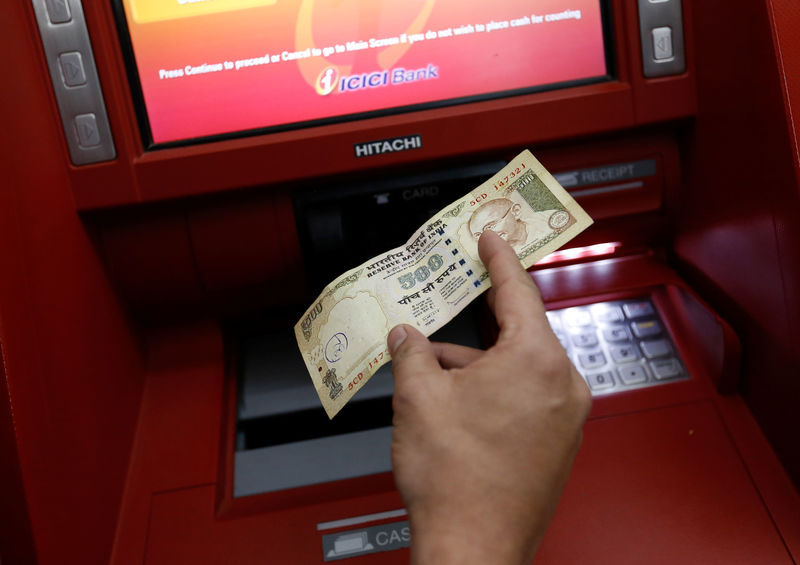By Devidutta Tripathy and Sankalp Phartiyal
MUMBAI (Reuters) - India's abolition of 500- and 1,000-rupee notes with virtually no warning caused confusion and concern among ordinary people and in sectors of the economy where cash is king, but banks and electronic payment services are among those licking their lips.
Among the biggest losers from the shock move, aimed at flushing out money hidden from the tax man in India's huge shadow economy, is expected to be property, and the sharp drop in the sector's stocks on India's two main exchanges on Wednesday reflected that.
It was better news for financial services companies involved in moving money around the formal economy, however, and among them was PayTM, India's top mobile payment wallet services provider.
It said it saw a 200 percent jump in app downloads and a 1,000 percent increase in the amount of money added to its wallets since Prime Minister Narendra Modi's announcement of the curbs late on Tuesday.
MobiKwik, which also offers mobile wallet services, said it saw a more than 40 percent increase in app downloads.
"We'll be a country with a lot more digital transactions and payments now," said Vijay Shekhar Sharma, chief executive of PayTM, whose biggest shareholder is Alibaba Group (N:BABA).
India's shadow, or "black", economy is estimated to be the size of about a fifth of its gross domestic product, with millions still having no access to formal financial services.
Most financial transactions still happen in cash, although alternative payments and the use of cards have risen fast in recent years.
Kotak Securities said it expected a large part of the shadow economy to become part of the formal economy, including the banking system, over time.
Banks will benefit from higher savings deposits, while more financial savings also bodes well for insurance, mutual funds and wealth management companies, analysts said.
Shares in top lender State Bank of India (NS:SBI) rose 2.9 percent on Wednesday on a Mumbai market (NSEI) that closed 1.3 percent lower. The banking sector index (NSEBANK) edged up 0.1 percent.
Global card network providers Visa and MasterCard welcomed the Indian decision, saying it would help cashless transactions. PayPal Holdings Inc called it a "master stroke" to make India a less cash-reliant economy.
PAIN FOR PROPERTY, GOLD, FOOD
The crackdown on unaccounted wealth will put further pressure on the real estate sector, considered a safe haven for "black" money and already battling slower home sales.
The impact will likely be felt by smaller developers and in the secondary sales market, making the real estate sector more illiquid for some time, said Anshul Jain, managing director for India at consultant Cushman & Wakefield.
"Working capital needs for small and medium developers and other businesses will be a lot higher," said Jain, adding that prices will correct in markets where substantial speculative investments have been made using unregistered cash.
DLF Ltd (NS:DLF), India's biggest listed property developer, slumped more than 17 percent in Mumbai trading on Wednesday, while the sector index (NIFTYREAL) fell 11.6 percent.
A DLF spokesman, however, said the bank note move would not make "any big difference" for larger real estate companies who carried out transactions through banking channels.
"It is only a popular perception that real estate spawns black money, which is actually not true."
The crackdown is also seen as negative for jewelers, as it could lower the demand for gold despite a short-term rush for the precious metal late on Tuesday, analysts said.
"Significant amounts of demand for gold used to get generated (by) unaccounted wealth," said Surendra Mehta, Secretary at India Bullion and Jewelers Association.
"Since such unaccounted money is set to lose value after the scrapping of 500 rupee and 1,000 rupee notes, demand for gold will also drop."
Mehta estimated India's gold demand would fall by 100-150 tonnes next year from an annual average of about 800 tonnes.
The central bank will launch a new series of 500 and 2,000 rupee notes later this week.
Other sectors that could be impacted in the short term due to shifts in demand include consumer goods and automobiles, Edelweiss Securities said.
Cement makers such as ACC (NS:ACC) and UltraTech (NS:ULTC) will be hit, as 70 percent of demand comes from housing, HDFC Securities analysts said, adding that they expected cement companies to cut production.

Food chain operators such as those run by Jubilant FoodWorks (NS:JUBI), which operates the Domino's Pizza and Dunkin' Donuts chains in India, will also be temporarily affected as students mostly buy in cash, the brokerage added.